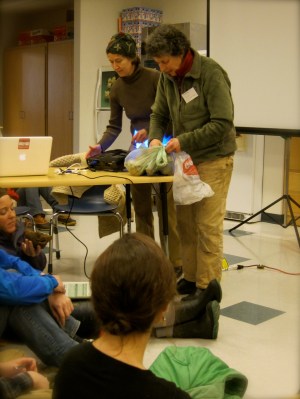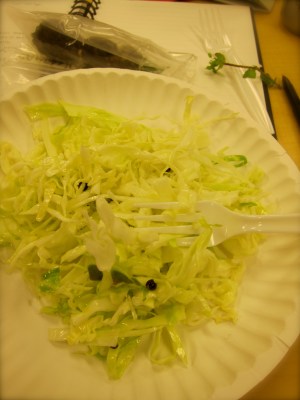Sometimes the most casual of gifts can have the most impact, especially when it comes to plants. As part of putting in more perennial vegetables this year, we plunked two unassuming sunchokes into the ground, and watched in wonder as the darn things took root and shot up.
I’d attended Didi Emmon’s presentation on wild edibles during NOFA-NH’s Winter Conference back in March. Based on her book, “Wild Flavors: One Chef’s Transformative Year Cooking from Eva’s Farm”, Emmons was accompanied for the afternoon’s talk by Eva herself. They both held the standing-room-only crowd in thrall, passing out juniper berries, chicory root, and chickweed for us to sample, and sunchokes to take home and plant. Above left: Didi and Eva; above right: a winter salad of cabbage and foraged juniper berries, along with my bag of sunchokes and a sprig of chickweed.
We kept the sunchoke tubers in a corner of the fridge until it came time to plant. A member of the sunflower family, we followed it all summer long as it grew, then grew some more. As the pair of them began to flower, they’d gotten so tall that the blooms were visible from the second story window.
Friends who grow sunchokes themselves came over and marveled at its height: “They’re supposed to be tall, but we’ve never seen them grow this tall.”
The stalks are thick as bamboo, we’re imagining they’re strong enough to build something sturdy with.
The tubers that grow underground are the edible part, and are better left in-ground for storing over winter. We’re waiting in anticipation to find out what we encounter when the time comes to finally them dig them up.









What an amazing plant. It must love where it’s planted to grow that tall. Congrats!
We have a healthy crop of sunchokes here on the farm as well, and my granddaughter and I attended the winter NOFA-NH in March. Small world.
I grew sun chokes one year. Got a nice crop and they tasted good, but they gave us gas something fierce. So we don’t grow them anymore. We grew them in a container, because once you plant them, they spread like wildfire. Good luck with yours.
Those are amazing! I know nothing about sunchokes.
Cristy, check out my December 2, 2011post about sunchoke: http://gardentowok.wordpress.com/2011/12/02/sunchoke-helianthus-tuberosus/
You must have some amazing soil to produce plants like that. They’re beautiful.
Wow, thanks! I think I’ve been growing them for years, from a little division given to me by a neighbor a long time ago. I knew I had some kind of perennial sunflower, but didn’t know what. I’ll have to dig up a plant key and find out for sure.
Eleanor
Dig some for fall/winter use. You are likely to have too many to use up in the spring. They store well in a root cellar and they are a good substitute for Chinese chestnuts in a stir-fry. They only take 30 seconds to cook. They also add a nice crunch to a winter salad, but don’t add too many as they can cause gas.
Mary, I believe you mean Chinese “water” chestnuts. Am I correct?
Chinese chestnuts are very different from Chinese water chestnuts.
Sunchoke once established is hard to get rid of. It is a versatile root crop. Some people do have problem digesting it and can have severe intestinal cramps. To learn more visit my December 2, 2011 post: http://gardentowok.wordpress.com/2011/12/02/sunchoke-helianthus-tuberosus/
That is a really impressive stalk on those and the height is amazing too. Added benefit – the sunflowers they produce are gorgeous as well.
I had butterflies about something and needed something soulful and inspirational and knew just where to find it! Beautiful post and pix.
What fun! They look fabulously impressive – very regal – hopefully the growth underneath matches what’s happening on top.
I think these are Jerusalem Artichokes, right? Watch out, they are very invasive!
I remember I read that seasoning these tubers with winter savory may help with gas…..wish I had marked that website.